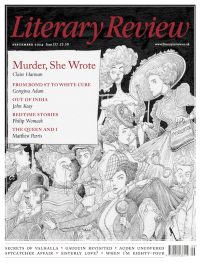Ella Fox-Martens
Girl at War
Earthly Creatures
By Stevie Davies
Honno Press 269pp £9.99
In the spring of 1941, nineteen-year-old Magda Arber is called to do her duty for the Führer and travel from her hometown of Lübeck to East Prussia to work as a village schoolteacher. There, she’ll remodel her tender young charges into ‘manly warriors’ and ‘resourceful mother[s]’. Magda is delighted at the chance to immerse herself in ‘brain work’ rather than physical labour and also to visit that ‘unseen and poetic land’, a place full of natural beauty and wild animals. The future is wide open and Magda – who for all her wilfulness can’t quite overcome the hateful political rhetoric surrounding her – is ready for it. Of course, the readers of Earthly Creatures, Stevie Davies’s rich and powerful new novel, know what its protagonist does not. By the time Magda returns to her hometown, it will be irrevocably, terribly changed.
Neither Germany nor the 1940s represents new ground for Davies. Her debut, Boy Blue, was set during the German bombing of the UK, and the Booker-longlisted The Element of Water plays out on the shores of Lake Plön after the end of the war. In these and other novels, Davies examines the ways in which external conflicts can disrupt internal lives. In Earthly Creatures, she explores notions of morality and righteousness in times of great horror and hatred, challenging readers to understand how climates of fear and indoctrination can alter the fabric of one’s thoughts. What lies do we tell ourselves in order to function? What makes a good human being, and what constitutes a fitting punishment for those who fall short?
We first see Magda as a naive young woman whose desire for knowledge and adventure has made her receptive to the lies of the Nazis. It’s a fraught challenge for a writer to convincingly evoke the horror and disillusion that Magda experiences. Yet Davies’s narration is precise and practised,

Sign Up to our newsletter
Receive free articles, highlights from the archive, news, details of prizes, and much more.@Lit_Review
Follow Literary Review on Twitter
Twitter Feed
Alfred, Lord Tennyson is practically a byword for old-fashioned Victorian grandeur, rarely pictured without a cravat and a serious beard.
Seamus Perry tries to picture him as a younger man.
Seamus Perry - Before the Beard
Seamus Perry: Before the Beard - The Boundless Deep: Young Tennyson, Science, and the Crisis of Belief by Richard Holmes
literaryreview.co.uk
Novelist Muriel Spark had a tongue that could produce both sugar and poison. It’s no surprise, then, that her letters make for a brilliant read.
@claire_harman considers some of the most entertaining.
Claire Harman - Fighting Words
Claire Harman: Fighting Words - The Letters of Muriel Spark, Volume 1: 1944-1963 by Dan Gunn
literaryreview.co.uk
Of all the articles I’ve published in recent years, this is *by far* my favourite.
✍️ On childhood, memory, and the sea - for @Lit_Review :
https://literaryreview.co.uk/flotsam-and-jetsam